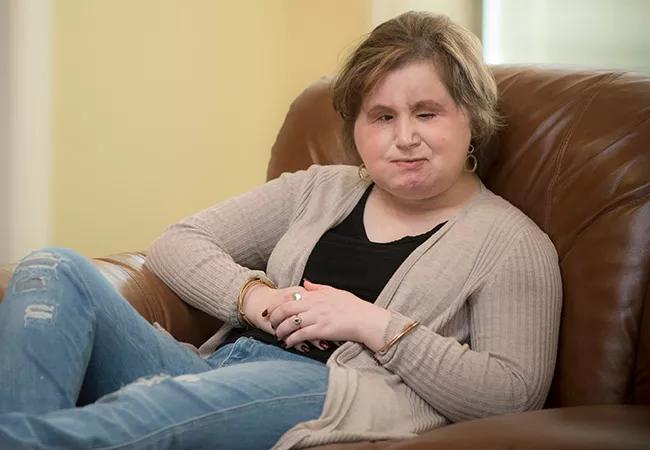Gunshot wound survivor's recovery continues

Image content: This image is available to view online.
View image online (https://assets.clevelandclinic.org/transform/490c3f6e-ff7c-48ca-a2f2-4fcafaff461d/First-Total-Transplant-Katie-After_jpg)
Katie Stubblefield After First Total Face Transplant
Katie Stubblefield continues to make strides one year after having the first total face transplant at Cleveland Clinic. She is the world’s youngest face transplant recipient.
Advertisement
Cleveland Clinic is a non-profit academic medical center. Advertising on our site helps support our mission. We do not endorse non-Cleveland Clinic products or services. Policy
A self-inflicted gunshot wound at age 18 left Katie unable to see, speak, breathe through her nose, swallow food, chew or move her tongue.
The trauma made hers the most extensive and complex of three face transplants performed at Cleveland Clinic since the first U.S. face transplant took place here in 2008.
Since her transplant at age 21, “Katie’s ability to swallow, speak, show emotion with her face and use her mouth to eat have improved considerably,” says Frank Papay, MD, Chairman of the Dermatology & Plastic Surgery Institute. “We don’t expect that improvement to stop.”
Six weeks after her injury, following surgeries at other hospitals, Katie arrived at Cleveland Clinic.
Over the next three years, she would have more than a dozen additional reconstructive surgeries.
“The reconstructions were challenging; we had few facial landmarks to build from, given the extent of her trauma,” says Brian Gastman, MD, her primary plastic surgeon.
But reconstruction alone could not correct Katie’s disfigurement or adequately improve her quality of life. She needed a total face transplant.
This required multiple in-depth evaluations, including extensive psychiatric and social evaluations to confirm that Katie — a suicide survivor — was fully committed to living.
Advertisement
They also had to ensure she had the extraordinary support system total face transplants require.
Once Katie was deemed a suitable candidate, the surgical team began practicing by doing “mock” face transplant surgeries.
“We used 3D-printed head models and augmented reality (AR) technology to visualize Katie’s anatomy in three dimensions,” says Dr. Papay. “We planned and planned and planned, and then we planned some more.”
Drs. Papay and Gastman led the surgical team with Maria Siemionow, MD, PhD, past Director of Plastic Surgery Research here (now at the University of Illinois at Chicago).
Once a donor was found in May 2017, the transplant procedure began. Experts from 15 specialties, including 11 surgeons, labored for 31 hours in two operating rooms. They effectively replaced 100 percent of Katie’s facial tissue, including her:
A small army of Cleveland Clinic experts — not just in plastic surgery, but also in anesthesiology, bioethics, dentistry, ophthalmology, endocrinology, infectious disease, psychiatry, pharmacy, nursing, physical therapy, occupational therapy and speech therapy — contributed to the procedure’s success.
“I’m extremely proud of this team for their commitment to making a difference in Katie’s life,” says Dr. Papay. “We are much more capable together than we are individually.”
“To reach this point of recovery has oftentimes been a difficult road to travel, but I’m thankful there’s been a road,” says Katie. “I am forever grateful for the care this hospital continues to offer on my journey of recovery and healing.
“And to my donor and her family – words cannot express the appreciation I have for this incredible gift. With a grateful heart, I say thank you.”
Approximately 40 face transplants have now been done worldwide. Cleveland Clinic is one of just six U.S. institutions to offer the procedure.
“Today, we can dramatically improve the lives of people whose facial trauma would have been inconceivable to treat a few decades ago,” says Dr. Gastman.
“With her new nose, lips, palate, eyelids and jaw, Katie now has the opportunity to rejoin society and have a future like any other young adult.”
Determined to use her experience to help others, Katie hopes her future will include serving as a spokesperson for adolescent mental health and suicide prevention.
Advertisement

Delivered every Tuesday!
Sign up for our Health Essentials emails for expert guidance on nutrition, fitness, sleep, skin care and more.
Learn more about our editorial process.
Advertisement
Cleveland Clinic first to use augmented reality in this way
Most recommended precautions center around minimizing bruising or swelling
Even one drink can have an impact on your cognitive function leading to slurred speech, blurred vision and impaired memory
Understand who may (and may not) benefit
Lorem ipsum dolor sit amet. Et odio Quis vel ipsam omnis eum alias deleniti et placeat impedit non voluptas galisum hic autem enim et cupiditate aliquid. Est beatae quidem non facilis autem ut commodi nisi aut tempore rerum et dolores voluptatem cum enim optio id sapiente quasi. Ad laboriosam officiis 33 cupiditate sequi ea voluptatum consectetur qui necessitatibus voluptate et quasi doloremque et facere explicabo quo explicabo officia
Seeking help through therapy can be an important step in improving your quality of life when you have UC
Type 2 diabetes isn’t inevitable with these dietary changes
Applying a hot or cold compress can help with pain
Pump up your iron intake with foods like tuna, tofu and turkey